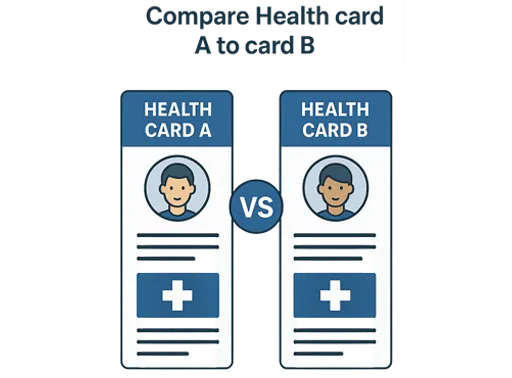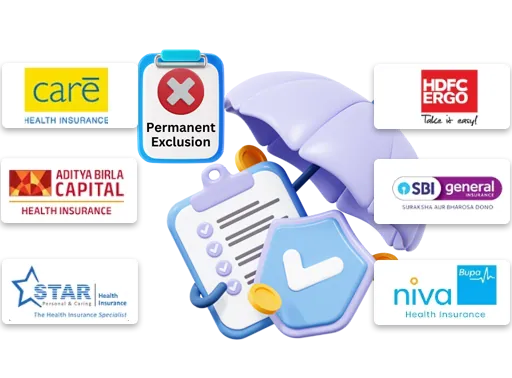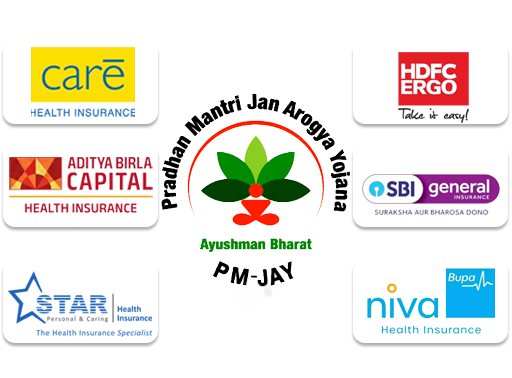Waiting Period In Maternity Health Insurance




Daina is a content writer with a profound grasp of Insurance, Stocks, and Business domains. Her extensive 3-year experience in the insurance industry equips her with a nuanced understanding of its intricacies. Her skills extend to crafting blogs, articles, social media copies, video scripts, and website content. Her ability to simplify complex insurance concepts into reader-friendly content makes her an expert in the domain.
Reviewed By:

Raj Kumar has more than a decade of experience in driving product knowledge and sales in the health insurance sector. His data-focused approach towards business planning, manpower management, and strategic decision-making has elevated insurance awareness within and beyond our organisation.
Updated on Jul 09, 2025 4 min read
Waiting Period In Maternity Health Insurance
The journey of parenthood is a significant and joyous phase of life, often accompanied by excitement, hope, and anticipation. In the modern age, where health care plays a pivotal role in ensuring a smooth and safe pregnancy, maternity health insurance has emerged as a valuable financial tool for expectant parents. These insurance plans are specifically designed to cover the medical expenses related to childbirth and maternity care. However, one essential aspect that potential policyholders must comprehend is the concept of the 'waiting period'. In this article, we will explore the waiting period in maternity insurance, its importance, implications, and ways to navigate through it effectively.
Understanding the Waiting Period
The waiting period in maternity health insurance refers to the duration during which the policyholder is not entitled to claim coverage for pregnancy-related expenses. It acts as a buffer time between purchasing the insurance policy and becoming eligible to avail of the benefits related to maternity care. Insurers implement the waiting period as a risk management strategy to prevent adverse selection, where individuals might buy insurance only when they anticipate using it soon.
The waiting period can vary significantly from one insurance provider to another and can range from a few months to a few years. Typically, the waiting period for maternity coverage is longer than other health insurance policies due to the high costs associated with pregnancy and childbirth. While it may seem like a deterrent, understanding the waiting period's rationale and the options available to policyholders can help make informed decisions. Maternity insurance with minimum waiting period is 9 months and it can go up to 3 years.
Types Of Waiting Periods In Maternity Plans
Maternity health insurance plans may have different types of waiting periods, each serving a specific purpose. These waiting periods are designed by insurance providers to manage risk, prevent adverse selection, and ensure that policyholders maintain their coverage for an extended period. Below are the common types of waiting period for maternity insurance:
- Initial Waiting Period The initial waiting pеriod is thе most basic maternity insurance waiting period found in almost all matеrnity health insurancе plans. It starts from thе policy's еffеctivе datе and typically lasts for 30 days or 90 days. During this pеriod, thе policyholdеr cannot claim any matеrnity-rеlatеd bеnеfits. This waiting pеriod is in place to prеvеnt pеoplе from purchasing a policy whеn thеy arе alrеady prеgnant or planning to concеivе soon.
- Pre-existing Condition Waiting Period Some maternity plans may include a waiting period specifically for pre-existing conditions related to pregnancy. If the policyholder has any pre-existing conditions, such as infertility issues or certain pregnancy-related conditions, the coverage for those conditions might be subject to a waiting period. This waiting period is typically longer than the initial waiting period and may vary based on the insurer's terms and conditions.
- Other Maternity-Related Waiting Period Certain plans imply waiting periods on other maternity-related things such as Ante Natal care, Miscarriage, In utero fetal etc, The waiting period for these can be anywhere near 12- 24 months depending upon the sum Insured.
Why Is Waiting Period Imposed?
It is important from an insurer's point of view that certain conditions come with a waiting period. Let us understand its significance in maternity insurance through the following points:
- Cost Management for Insurers Maternity and childbirth-related expenses can be substantial, encompassing prenatal care, hospitalization, delivery charges, and postnatal care. By imposing a waiting period, insurers can mitigate the risk of covering high-cost claims immediately after the policy is purchased. It allows them to manage their financial liabilities and maintain the stability of their insurance plans.
- Discouraging Adverse Selection Without a waiting period, some individuals might be inclined to purchase maternity health insurance only when they are planning to conceive or are already pregnant. This haste can lead to buying a policy which is not sufficient enough or doesn't have all of the necessary features. Since the waiting period is long enough, people buy way in advance leading to a better decision when it comes to choosing a policy.
- Encouraging Long-Term Policy CommitmentWaiting periods incentivize policyholders to maintain their insurance coverage for an extended period. When individuals know they must wait for a certain duration to claim maternity benefits, they are more likely to retain the policy, which benefits both the insurer and the insured in the long run.
Important Points to Remember
The policyholders should keep in mind that:
- Possible Out-of-Pocket Expenses During the waiting period for maternity insurance, any pregnancy-related medical expenses incurred by the policyholder will not be covered by the insurance provider. As a result, individuals may need to bear these costs out of their pockets until the waiting period is over.
- Risk of Unforeseen Complications While planning for parenthood is essential, life can be unpredictable, and unforeseen circumstances may arise. In the event of an unplanned pregnancy during the waiting period, policyholders must be prepared to handle the expenses related to maternity care without insurance coverage.
- Reviewing Policy TermsUnderstanding the specific terms and conditions related to the waiting period is vital. Different insurers might have varying rules, such as the specific period, coverage limits, and exclusions. Policyholders should carefully review these aspects before finalizing their insurance plans.
- Addition of Female PolicyholdersIt is important that the female planning to benefit from the maternity plan is added to the policy and serves the entire waiting period.
- Wholesome CoverageMaternity plans do not solely cover maternity expenses. These plans also offer benefits like in-patient hospitalization, daycare procedures, PEDs etc. These plans can also be ported to other policies once the maternity benefits have been used and the policyholder wants to move to a different plan with more features.
Navigating Through the Waiting Period Effectively
To make the most of your maternity insurance, keep the following points in mind.
- Researching Insurance Plans Before selecting a maternity health insurance policy, prospective policyholders must conduct thorough research on various insurance providers and their offerings. Comparing waiting periods, coverage options, premium costs, and customer reviews can aid in making an informed decision.
- Advanced Planning is Essential Given the waiting period's existence, it is crucial for individuals or couples considering parenthood to plan well in advance. If pregnancy is on the horizon, purchasing maternity health insurance at the right time becomes imperative to ensure that coverage is available when needed.
- Buying in the Age Gap The minimum age to buy maternity insurance is 18 years whereas the maximum age is 45 years. So it is important that you plan to buy a maternity plan in the given age gap.
In a Nutshell
Maternity health insurance plays a crucial role in ensuring comprehensive healthcare coverage for expectant parents and their newborns. The waiting period is an essential aspect of these insurance policies that potential policyholders must understand and plan for. By comprehending the rationale behind the waiting period and exploring different strategies to navigate through it effectively, individuals can make informed decisions to safeguard their financial well-being during the precious journey of parenthood. Remember, advanced planning, thorough research, and timely policy selection are the keys to making the most of maternity health insurance.
Consult for Personalized Insurance Advice

But how does it work?
Schedule a call with India’s number 1 trusted advisor with a 4.5+ rating on Google. We are not your average insurance agents. Our advisors are experts in their insurance knowledge and will give you the right information at the right time. The service is free of cost! Don’t worry, we won’t spam as we value your time.
Health Insurer Network Hospitals
Waiting Period In Maternity Health Insurance : FAQ
1. What is a waiting period in maternity health insurance?
The waiting period in maternity health insurance refers to the time duration during which you cannot claim coverage for pregnancy-related expenses. It acts as a buffer between purchasing the insurance policy and becoming eligible for maternity benefits.
2. Why do insurance companies have waiting periods for maternity coverage?
Insurance companies use waiting periods as a risk management strategy to prevent people from buying insurance only when they are already pregnant or planning to conceive soon. It helps them manage costs and maintain stable insurance plans.
3. How long does thе waiting period typically last in maternity health insurance?
The waiting period can vary from one insurance provider to another, but it is usually longer than other health insurance policies due to the high costs associated with pregnancy and childbirth. It can range from 9 months to 3 yеars.
4. Can I get coveragе for my pregnancy during the waiting period?
No, during the waiting period, any pregnancy-related expenses you incur will not be covered by the insurance company. You will have to bear these costs out of your pocket until the waiting period is over.
5. How can I plan for maternity coverage effectively?
To plan for maternity coverage effectively, consider purchasing maternity health insurance well in advance of your planned pregnancy. Research different insurance plans, compare waiting periods, and opt for policies that suit your needs and timelines.
Health Insurance Companies
Know More About Health Insurance Companies

















